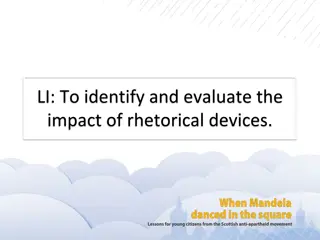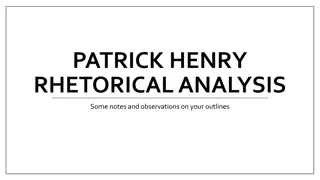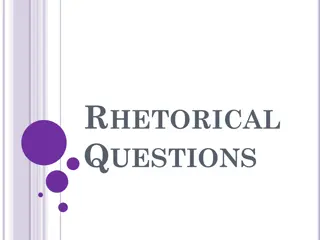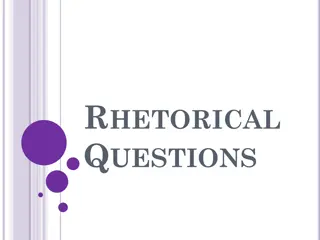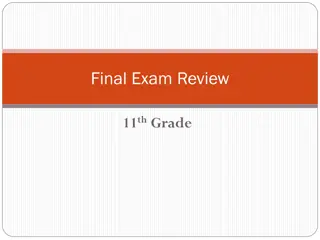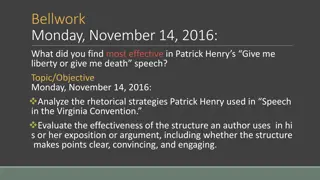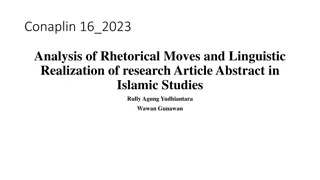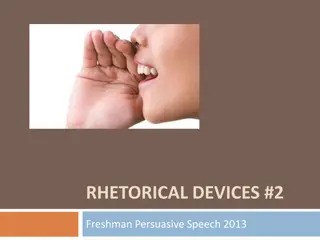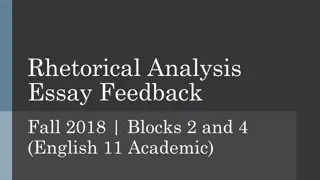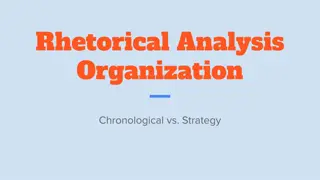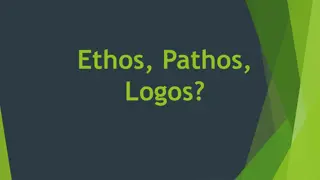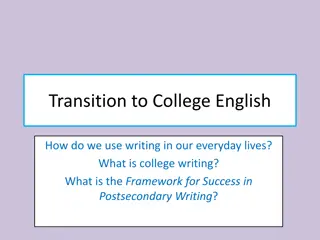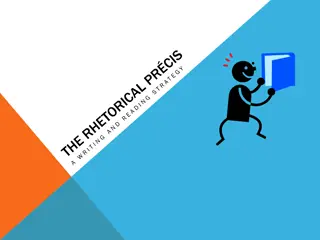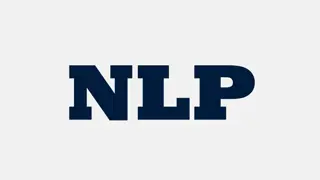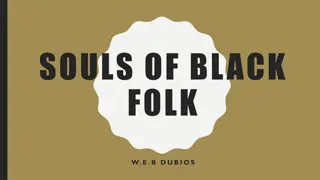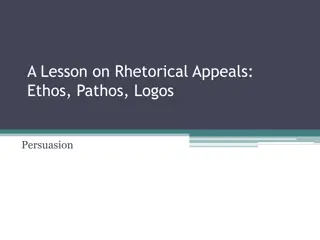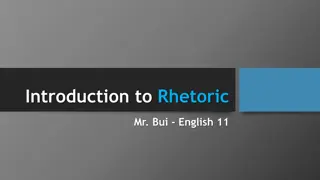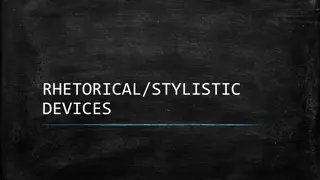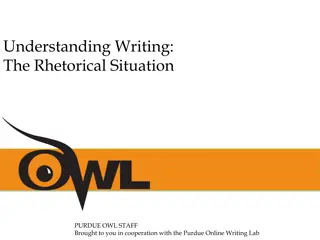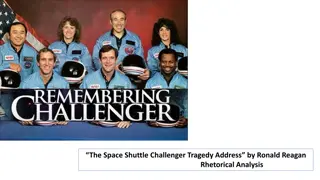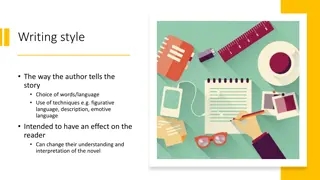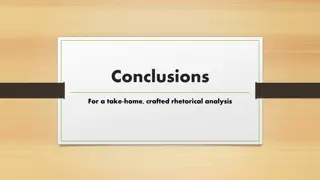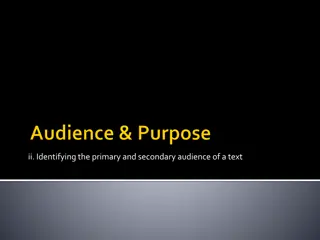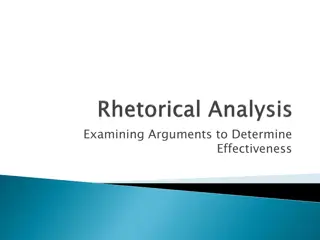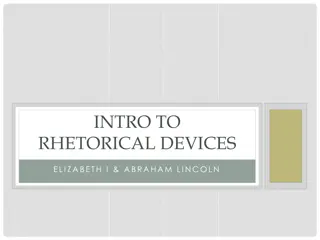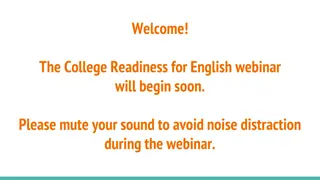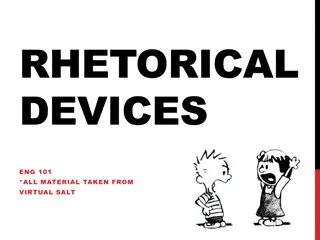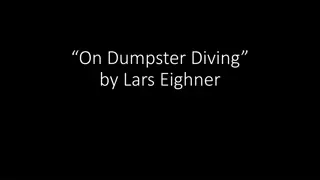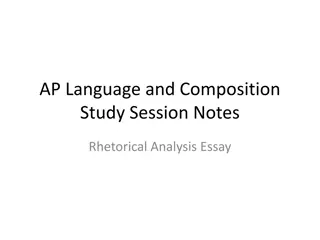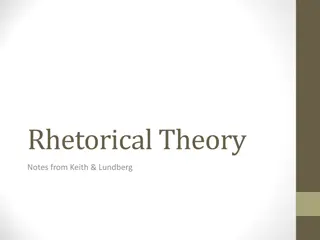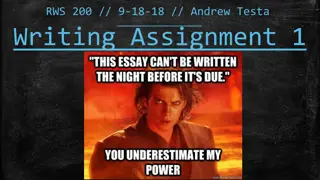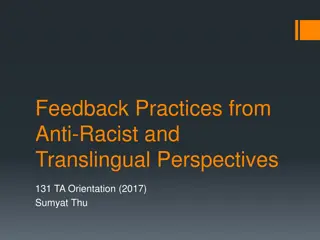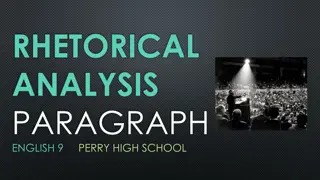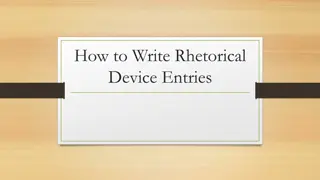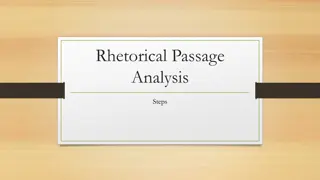AP Language Multiple Choice 2020 Changes and Analysis by Mrs. Opaleski
Overview of the AP Language multiple-choice exam changes for 2020, including question types, tips for answering questions effectively, and strategies to optimize your performance. The exam consists of 45 questions in 60 minutes, focusing on rhetorical analysis and composition tasks based on passages
0 views • 31 slides
Impact of Rhetorical Devices in Speeches by Malala Yousafzai, Martin Luther King Jr., and Greta Thunberg
The speeches by Malala Yousafzai, Martin Luther King Jr., and Greta Thunberg exemplify the power of rhetorical devices such as rhetorical questions, repetition, emotive language, and direct address. These devices effectively convey their messages and evoke strong emotions, highlighting the importanc
0 views • 11 slides
Analyzing Patrick Henry's Rhetorical Strategies
Explore the effective use of rhetoric by Patrick Henry in his speech to ignite rebellion during the American Revolution. The analysis focuses on his use of allusion, metaphor, and powerful language to convince delegates to engage in war against England.
0 views • 8 slides
Analyzing Rhetorical Devices in Super Bowl Ads
Explore the use of rhetorical devices such as rhetorical questions, emotive language, parallel structures, and more in the context of Super Bowl advertisements. Students will learn to identify and analyze these devices to understand their impact on the effectiveness of advertising messages.
0 views • 42 slides
Rhetorical Questions and Their Purpose
Rhetorical questions are used in communication to persuade or influence others without expecting an answer. They can be seen in debates, where the goal is to change people's minds. This content explains the meaning of rhetorical questions, why they are used, how to identify them, and provides exampl
0 views • 12 slides
Rhetorical Questions: Meaning, Usage, and Examples
Rhetorical questions are used to persuade and influence people by posing inquiries that do not require actual answers. By delving into the meaning, purpose, and identification of rhetorical questions, this comprehensive guide sheds light on how these questions play a crucial role in communication an
1 views • 17 slides
Literary and Rhetorical Terms Explained: A Visual Guide
Dive into the world of figurative language with this comprehensive visual review of literary and rhetorical terms. Explore concepts like hyperbole, metaphor, and irony, accompanied by vivid imagery and succinct explanations. Enhance your understanding of literary devices and their usage in writing a
0 views • 75 slides
Analyzing Rhetorical Strategies in Patrick Henry's Speech
Explore the effective rhetorical strategies used by Patrick Henry in his influential speech "Give me liberty or give me death" delivered at the Virginia Convention. Dive into the structure and persuasive elements of the speech to understand its impact on the audience and its historical significance.
1 views • 16 slides
Analysis of Rhetorical Moves in Islamic Studies Research Abstracts
Investigating rhetorical moves and linguistic realization in research article abstracts in Islamic studies reveals the prevalence of specific moves such as Purpose and Results, while Conclusion is least common. Different articles apply varying numbers of moves based on Hyland's framework.
1 views • 9 slides
Mastering Rhetorical Devices for Persuasive Speech - Tips & Examples
Unveil the power of rhetorical devices in persuasive speech through parallelism, rhetorical questions, analogies, personification, and allusions. Understand how to captivate your audience and convey your message effectively using these tools.
1 views • 11 slides
Rhetorical Analysis Essay Feedback for Improved Writing
Detailed feedback on rhetorical analysis essays for English 11 Academic students in Fall 2018, focusing on introduction, topic sentences, evidence, analysis, clinch, and conclusion to enhance writing skills. Emphasis on content, style, avoiding clichés, and maintaining analysis in present tense.
0 views • 33 slides
Analyzing Chief Seattle's Rhetorical Strategies
Explore the organizational strategies of chronological and strategic approaches in a rhetorical analysis of Chief Seattle's speech. Learn how to chunk the text and identify key rhetorical devices used by the author to convey a powerful message about nature and respect for the land.
0 views • 11 slides
Historic Speech Excerpts Reflecting Rhetorical Techniques
Excerpts from speeches by Martin Luther King Jr., Barack Obama, and Ben Bernanke showcase the use of ethos, pathos, and logos in persuasive communication. Each speaker employs different rhetorical strategies to convey their messages effectively. King's emotive appeal, Obama's strategy of outlining s
0 views • 13 slides
Rhetoric in College Writing
Exploring the significance of rhetoric in college writing, this content highlights the essence of situated communication, rhetorical situations, and the use of various devices in analyzing texts such as political speeches and hip-hop culture. It emphasizes the importance of understanding author purp
0 views • 11 slides
Rhetorical Précis Writing
A rhetorical précis is a structured four-sentence paragraph that addresses the rhetorical situation of a discourse, capturing essential elements such as the author's name, title, publication date, major assertion, purpose, and audience relationship. The first sentence introduces the author and thes
0 views • 10 slides
Analyzing Discourse Structures in Natural Language Processing
This content explores various aspects of NLP including discourse analysis, parsing, rhetorical relations, and argumentative zoning. It delves into understanding text structures, relationships, and the use of different rhetorical devices. Examples and illustrations are provided to aid comprehension a
0 views • 8 slides
Mastering Rhetorical Devices and Delivery Techniques for Effective Speeches
Explore the art of utilizing rhetorical devices such as aphorisms, allusions, analogies, and juxtaposition to enhance your speech delivery. Understand the significance of body language in communication and learn how to adapt it based on your audience, topic, and message. Discover the impact of varyi
0 views • 14 slides
Analysis of Du Bois' Use of Prejudice and Rhetorical Devices in 'Souls of Black Folk'
In W.E.B. Du Bois' "Souls of Black Folk," he explores the concept of prejudice and its impact on the African American community. Du Bois contrasts white Americans' perspective on prejudice as a defense of culture with the reality of how it humiliates and undermines African Americans. Through powerfu
0 views • 9 slides
Rhetorical Appeals: Ethos, Pathos, Logos
Delve into the art of persuasive communication through the exploration of ethos, pathos, and logos appeals. Discover how these rhetorical tools are utilized to sway audiences' emotions, logic, and credibility. Gain insights on how to analyze and decipher persuasive techniques employed by writers, sp
0 views • 26 slides
Unveiling the Art of Rhetoric: A Comprehensive Guide for English 11 Students
Delve into the world of rhetoric with Mr. Bui as your guide in English 11. Explore the definition, background, and significance of rhetoric, along with key concepts such as SOAPStone, the Rhetorical Triangle, and the Rhetorical Appeals (Ethos, Logos, Pathos). Learn how Aristotle laid the foundation
0 views • 24 slides
Rhetorical and Stylistic Devices in Speeches
Delve into the world of rhetorical and stylistic devices used in speeches, such as repetition, imagery, and devices of comparison like simile, metaphor, analogy, and juxtaposition. Understand how these devices enhance the impact and effectiveness of communication, with examples ranging from politica
0 views • 10 slides
Mastering the Rhetorical Situation in Writing
Explore the key elements of the rhetorical situation - culture, context, writer, audience, purpose, topic, genre, and audience. Understand how factors like age, experiences, and education influence your writing. Learn how context, timing, and cultural significance shape the need for writing, all whi
0 views • 13 slides
Analyzing Ronald Reagan's Rhetorical Approach in The Space Shuttle Challenger Tragedy Address
Explore the rhetorical analysis of Ronald Reagan's address following the Space Shuttle Challenger tragedy. The analysis delves into the speech's purpose, Reagan's handling of blame, balancing tragedy with exploration, and the importance of leaders addressing the nation in times of crisis.
0 views • 26 slides
Analyzing Writing Style Techniques in Chinese Cinderella
The way an author tells a story through writing style features like first-person point of view, rhetorical questions, dialogue, and connotations can greatly impact the reader's understanding and interpretation of a novel. Through the use of personal pronouns, rhetorical questions, direct dialogue, a
0 views • 8 slides
Crafting an Effective Conclusion in Rhetorical Analysis
Enhance your take-home rhetorical analysis with impactful conclusions. Remember to review the thesis, main ideas, and overall significance without criticizing the writer's style. Use concise sentences to reflect on the relevance of the piece and provide predictions for the future or the impact of th
0 views • 8 slides
Analyzing Rhetorical Strategies in Poetry
Explore how authors use rhetorical strategies to appeal to primary and secondary audiences in a series of poetic texts by Robert Graves and N. Scott Momaday. The poems offer insights into themes of nature, war, remembrance, and cultural traditions, showcasing the power of language to connect with re
0 views • 10 slides
Effective Argument Analysis Strategies and Writing Techniques
Explore the key qualities of effective arguments, from sophistication of thought to coherence, and learn strategies to analyze rhetorical situations. Discover various forms of writing, including memoirs, essays, and speeches. Dive into the world of figurative language and word choice, understanding
0 views • 16 slides
Rhetorical Devices in Speeches of Elizabeth I and Abraham Lincoln
Explore the use of various rhetorical devices such as imagery, diction, connotation, denotation, metaphor, analogy, juxtaposition, antithesis, parallelism, repetition, and polysyndeton in the speeches of Queen Elizabeth I and President Abraham Lincoln. Witness how these rhetorical techniques enhance
0 views • 12 slides
Essential Habits and Skills for College Writing Success
Explore the framework for success in postsecondary writing, focusing on eight essential habits of mind, including curiosity, openness, engagement, creativity, persistence, responsibility, flexibility, and metacognition. Delve into rhetorical knowledge and dexterity, emphasizing the ability to read,
0 views • 17 slides
Rhetorical Devices: An Analysis Through Literary Examples
Delve into the art of rhetorical devices through captivating examples from renowned literary works. Discover the power of techniques like anadiplosis, anaphora, and apostrophe as they enhance the beauty and impact of language. Uncover how repetition at strategic points can create rhythm, emphasize k
0 views • 22 slides
Rhetorical Approach to Translation Studies: Challenges and Perspectives
This study explores the emergence of a rhetorical approach in Translation Studies, aiming to counter empiricism and highlight the importance of subjectivity and interpretation in translation. By examining paradigms in Translation Studies, it contrasts the scientistic drive for objectivity with a hum
0 views • 34 slides
Analyzing "On Dumpster Diving" by Lars Eighner
This analysis explores the rhetorical strategies, language usage, and irony in Lars Eighner's essay "On Dumpster Diving," focusing on allusions to Kerouac and Steinbeck, the appeal to ethos, logos, and pathos, and the distinction between scavengers and scroungers. It delves into the effects of scien
0 views • 6 slides
Analyzing Benjamin Banneker's Rhetorical Strategies Against Slavery
Explore how Benjamin Banneker, a former slave's son, utilized rhetorical strategies in his letter to Thomas Jefferson to argue against slavery in 1791. Understand Banneker's background, intended audience, and historical context to grasp the effectiveness of his argument.
0 views • 23 slides
Rhetorical Theory: Key Concepts and Applications
Rhetorical theory explores the study of persuasive language and communication, tracing its origins from Plato to modern applications in shaping identity, power dynamics, and democracy. The theory delves into the importance of audience analysis, ethical considerations, and the interplay between messa
0 views • 14 slides
Analyzing JFK's Rhetorical Devices in Inaugural Address
Explore the rhetorical devices used by JFK in his Inaugural Address through a formal academic lens. Understand the purpose, audience, claims, and counterclaims presented in the speech. Discover the impact of rhetorical devices like ethos, pathos, logos, and more on the overall message conveyed by JF
0 views • 13 slides
Mastering Rhetorical Analysis in Academic Writing
Dive into the essentials of analyzing and evaluating authors' arguments, claims, and rhetorical strategies in academic texts. Uncover how ethos, pathos, and logos contribute to persuasion and explore effective writing techniques and strategies. Enhance your understanding of constructing introduction
0 views • 37 slides
Promoting Anti-Racist and Translingual Feedback Practices in Language Education
Embracing anti-racist and translingual perspectives in language education challenges the dominant monolingual English ideology. The focus shifts towards empowering students to leverage their full language repertoire, evaluating language based on rhetorical effectiveness, and resisting standardizatio
0 views • 11 slides
Analyzing Rhetorical Devices in King and Wiesel Speeches
Explore the rhetorical devices used by Martin Luther King Jr. and Elie Wiesel in their speeches through the lens of ethos, pathos, logos, repetition, parallelism, metaphor, allusion, imagery, diction, and rhetorical questions. Understand how these devices strengthen the authors' positions and argume
0 views • 10 slides
Analyzing Rhetorical Devices in "The Santa Ana Winds" by Joan Didion
Exploring the use of rhetorical devices in Joan Didion's essay "The Santa Ana Winds," focusing on the mood created through diction and imagery. Through careful analysis, the essay demonstrates how Didion strategically develops an ominous atmosphere that evokes a sense of unease and impending danger
0 views • 8 slides
Guide to Rhetorical Passage Analysis
Learn the essential steps for writing a rhetorical passage analysis, from selecting a significant text passage to analyzing the speaker, occasion, purpose, audience, and supporting rhetorical strategies. Illustrative examples from "The Boys in the Boat" demonstrate how to apply these steps effective
0 views • 7 slides

